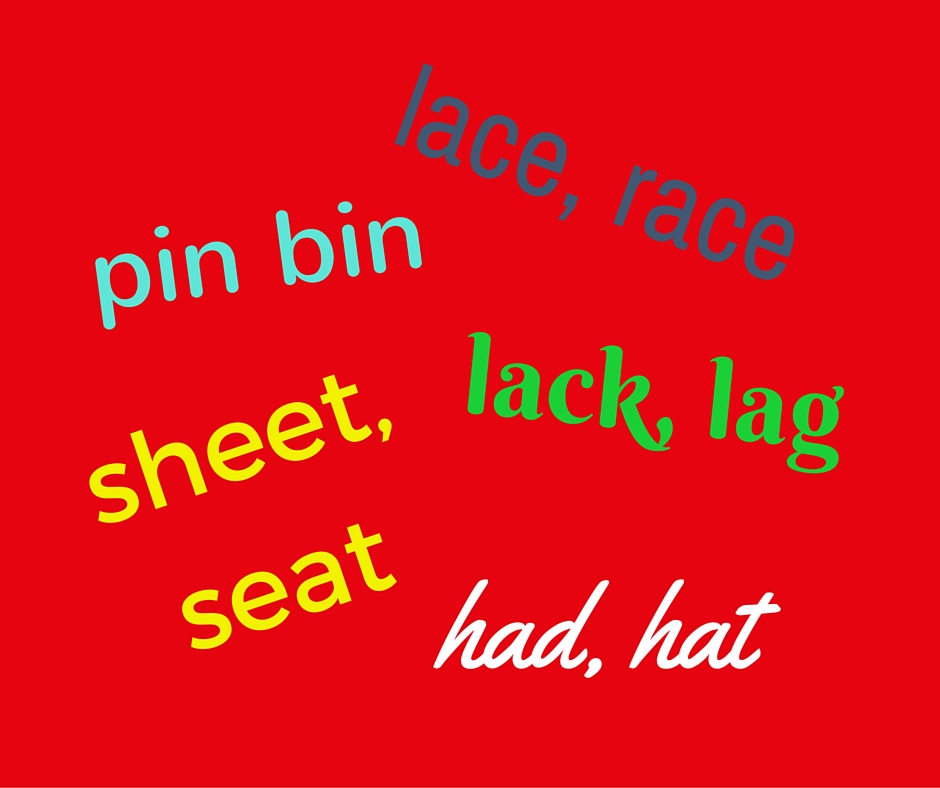Here are some examples of important “minimal pairs” to conquer, for different language speakers who are working on their English pronunciation.
For Arabic speakers learning English pronunciation, the letter P (or rather, it’s absence or replacement) may cause problems for listeners. Depending on the Arabic dialect and individual speakers, /p/ may be replaced with /b/, or /f/, resulting in confusion between words like [paste, baste] or [pill, bill] if the letter is at the beginning of the word. Middle of the word minimal pairs to work on are words like [crumpled, crumbled]. And word on word-final minimal pairs such as [cap, cab] or [stripe, strife] also.
For Japanese speakers pronouncing English, one set of troublesome consonants are /f,v/ and examples of minimal pair words are [fairy, very] for word-initial position, [refuse, reviews] for mid-word position, and [half, have] for word-final position.
For Spanish speakers, one set of troublemakers may be /p, b/. An example of word-initial pairs is [peg, beg]. A pair of middle-position words is [rapid, rabid], and a word-final pair is [tap, tab].
P and B also cause problems for Chinese speakers, who may also struggle with the difference between /b,d/ and /w,v/.
Tamil speakers may have difficulty with the difference between /v, th/, or /th, s/.
These are just a few examples of interfering consonants, but English vowels pose an even greater challenge, because English has so many more vowels than most other languages. Minimal pairs provide a great way to practice feeling the sounds, hearing oneself speaking the sounds, and becoming comfortable with their articulation. Here’s how and why you should use minimal pairs in your pronunciation practice.
TO RAISE AWARENESS
The first important use of minimal pairs is to raise awareness in students that the difference exists. Some of us can’t hear the target sounds we are trying to learn. It can be difficult, because you can’t pronounce what you can’t hear. Many of us will be able to recognize them once we are made aware; with listening discrimination exercises like manythings.org/pp, students realize there are two sounds, and they’ll have to determine where one sound ends and the other begins. The manythings website has limited numbers of word pairs—but it is fun! In addition, I made recordings of lots more target minimal pairs for my students, so they can develop their ability to hear the two sounds as different, whether they occur at the beginning, the middle or the end of the word.
TO DEVELOP SKILL IN ARTICULATION
The second important use of minimal pairs is to model the difference in pronunciations, so students can begin imitating and practicing their own sounds. Because the pair of sounds may fall at the beginning, middle or end, the challenges to forming the target sound will involve where to put one’s tongue, how to hold one’s jaw, what to do with one’s lips, whether to vibrate the vocal chords or not. This takes experimentation and lots of attempts, and feedback on their successes is very important. If students can hear the difference between the sounds on manythings.org/pp, then they can probably hear the difference in their own recorded pronunciations of sounds and words. This is great! Have them record themselves, listen to themselves, practice to make perfect, and then share their best performance with you or someone who can discriminate the two sounds. (If you have a mixed class from many countries, this could work out well for you, because some may hear what others cannot, at the start. They can give each other feedback.) The teacher can shorten the list of practice pairs by highlighting the pairs that need more work. This is the place you remediate and instruct.
TO MAINTAIN NEW SOUNDS
I ask all my adult students to revisit their problem sounds, record themselves saying their minimal pairs, listen to asses their performance, and, if they realize they’re losing their news skills, work hard at regaining them. They’ll have all the tools they need.
There are more and more minimal pair word materials online for free. One of the free sites I use often is www.manythings.org/pp. It has listening discrimination games that help develop student awareness of the differences. Very useful and student friendly.
When I teach, I also use Pronunciation Contrasts in English, by Don and Alleen Nilsen, published by Prentice Hall Regents. It used to inexpensive but with the resurgence of interest in pronunciation teaching, they’ve raised their price. Still, I end up using some part of it for just about every adult pronunciation client I have, so for me, the investment was worth it. Although, if you have the spare time, you could come up with your own lists, record them, and publish them yourself!
[layout show=”2″]
